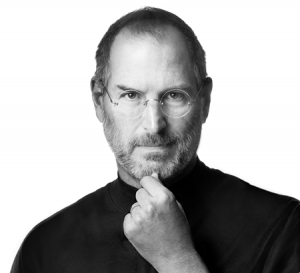From the time he released the original line of Macintosh computers to the latest MacBook Pros, the late Steve Jobs had an indelible impact on Ithaca College.

Jobs was behind many of the technological strides and innovations over the last few decades. He released Macintosh, one of the first successful personal computer series, and he was involved with Pixar Animation Studios, now a filmmaking powerhouse. He created iTunes, which set a business model for online digital media and transformed the music industry.
Excluding strategic communication, all academic departments in the Roy H. Park School of Communications require or strongly encourage students to purchase a MacBook Pro.
Ed Fuller, vice president of Information Technology Services, said the college has had an interest in Apple products since it purchased one of the original Macintosh computers in 1984, and the Mac has become a staple of the college because of its graphic capabilities.
“Its popularity has grown significantly in the last six-to-ten years, especially since the invention of the iPod and some of the other devices Apple has produced,” he said. “It’s sad we’ve lost him. He was one of the true geniuses of our time.”
Fuller said Jobs’ influence on the college couldn’t just be measured solely in terms of the success of the Mac, but also in how he changed the computing experience.
“Try to think of a world where you didn’t have a computer you could interact with through pictures and sound and touch screen interfaces,” Fuller said. “Pretty much all of that, Apple Computers, through the inspiration and creativity of Steve Jobs, brought to the world.”
John Barr, associate professor and chair of the computer science department at the college, said Jobs was one of the “technology gods.” Barr said while Jobs didn’t have a lot of engineering skills himself, his success came from his ability to create an emotional connection between the consumer and a “piece of metal.”
“Jobs really put the personal in the personal computer,” Barr said. “When he gave us the original Macintosh back in 1984, it came on, and there was a smile on the screen and it talked to you. That changed everything.”
Jobs, who dropped out of Reed College, built the first Apple computer in 1976 with longtime friend Steve Wozniak in his parents’ garage. Thirty-five years later, Apple Computers has the second-highest market value of any other company, only behind ExxonMobil, according to Forbes.
Most recently, Apple released the iPhone under Jobs’ guidance, which has sold more than 100 million units, according to Apple, and the iPad, a tablet that reinvented personal computing.
Junior Emily Menez, a television-radio major, said Jobs’ greatest achievements came from his innovative spirit, his ability to take risks and his work ethic. Menez said without Jobs, the lives of college students would be much different.
“He’s had such an influence on our generation, and we wouldn’t have the technology we have today without him,” Menez said.
Ari Kissiloff, assistant professor of strategic communications, said he was surprised the airtime spent covering Jobs’ death speaks to Jobs’ influence and importance.
“There were 13 minutes devoted to Steve Jobs on a half-hour long network television show,” Kissiloff said. “Maybe if a president died, but I can’t think of anybody else who would get that kind of airtime, because of how prolific he was.”
Kissiloff said though Jobs was an inspiration to many people, the public knows little about his private life. The day after Jobs’ death, pre-orders for Walter Isaacson’s biography “Steve Jobs” shot to the top of Amazon’s preorders.
Elizabeth Nonas, chair of the cinema, photography and media arts department, said what made Steve Jobs so prolific was his attention to detail, desire for perfection in releasing products that were as good as they could be, and being steps ahead of the cultural zeitgeist.
“He really did change the world,” Nonas said. “You could say this is a capitalist society and it’s about having gadgets, but it’s more than that, the way he designed things and came up with what we want before we knew we wanted it.”







